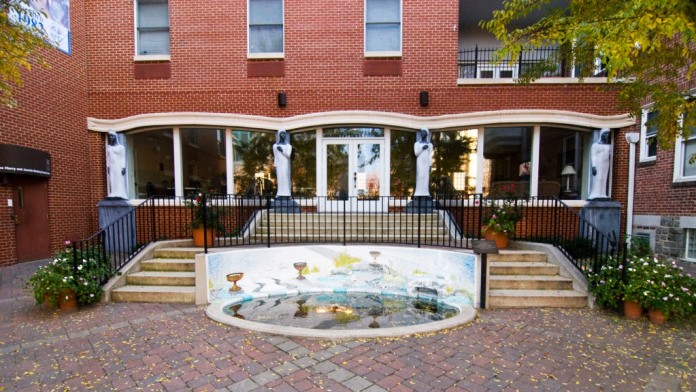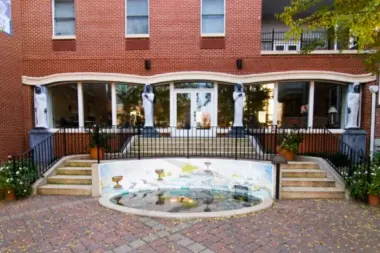Every staff member shows you they are not just here for a job, they go there to change lives. I am so thankful to all of them for showing me the way and the appreciation I needed to promote my self worth and become a better version of myself
About Marian House
Marian House provides substance abuse treatment, support and safe housing for women and their children in Baltimore, Maryland. Guests receive education regarding addiction and how it affects thinking patterns and relationships. They address dual diagnosis issues that often accompany substance abuse, like anxiety and depression. You’ll attend 12 step meetings that help you stay accountable with your recovery. Some women may have been separated from their children and Marian House works to reunite them with supervised visitation and social events.
Their transitional and permanent housing services support recovery and provide structure while helping guests work on their independence. Residents will work closely with dedicated education coordinators and can visit the George McManus Education Center. Marian House partners with Greater Homewood Community Corporation so clients can take GED classes and receive tutoring.
You’ll have employment assistance and help with job placement. The program includes a full-time employment counselor to assist residents with employment avenues. This service includes resume writing, interview training, job search assistance and development and employment retention education.
During your time at Marian House, you’ll learn typical life skills that help you become independent and productive for long-term sobriety. You’ll have weekly household chores, prepare meals and work as a team to help you learn about community and interaction with others.
The team at Marian House promotes helping others. You’ll learn how to trust your housemates and develop healthy relationships. The shared work, meals and celebrations focus on being part of the community. Once you complete the program then they can refer you to their permanent housing locations nearby including Serenity Place and Independence Place.
Latest Reviews
Rehab Score
Gallery


Other Forms of Payment
Private insurance refers to any kind of healthcare coverage that isn't from the state or federal government. This includes individual and family plans offered by an employer or purchased from the Insurance Marketplace. Every plan will have different requirements and out of pocket costs so be sure to get the full details before you start treatment.
Self-pay involves paying for treatment out of your own pocket. You can use savings or credit, get a personal loan, or receive help from family and friends to fund your treatment. If you don't have insurance or your insurance plan doesn't cover a specific program, self-pay can help ensure you still get the care you need.
Medicare is a federal program that provides health insurance for those 65 and older. It also serves people under 65 with chronic and disabling health challenges. To use Medicare for addiction treatment you need to find a program that accepts Medicare and is in network with your plan. Out of pocket costs and preauthorization requirements vary, so always check with your provider.
Medicaid is a state based program that helps lower-income individuals and families pay for healthcare. Medicaid covers addiction treatment so those enrolled can use their coverage to pay for rehab. When a program accepts Medicaid the client often pays very little or nothing out of their own pocket.
Addiction Treatments
Levels of Care
Residential treatment programs are those that offer housing and meals in addition to substance abuse treatment. Rehab facilities that offer residential treatment allow patients to focus solely on recovery, in an environment totally separate from their lives. Some rehab centers specialize in short-term residential treatment (a few days to a week or two), while others solely provide treatment on a long-term basis (several weeks to months). Some offer both, and tailor treatment to the patient's individual requirements.
Clients receiving support in a rehab aftercare program typically partner with their case manager and care team to identify and access the services that best align with their recovery needs and goals. Rehab aftercare services are designed to evolve with clients' changing needs to promote their long-term sobriety. Care modalities are highly customized and may include a range of medical, mental health, and social service resources, including peer coaching, career counseling, and 12 step program induction.
12-step programs are addiction recovery models based on Alcoholics Anonymous (AA). A number of substance abuse programs (including some drug and alcohol rehab centers) use the 12 steps as a basis for treatment. Beginning steps involve admitting powerlessness over the addiction and creating a spiritual basis for recovery. Middle steps including making direct amends to those who've been hurt by the addiction, and the final step is to assist others in addiction recovery in the same way. 12-Step offshoots including Narcotics Anonymous (NA), Cocaine Anonymous (CA), Dual Recovery Anonymous (DRA), Sex and Love Addicts Anonymous (SLAA) and Gamblers Anonymous (GA).
Sober Living Houses (SLHs), aka sober homes or halfway houses, are safe, substance-free, supportive living facilities for those recovering from substance abuse. Ideal for those who've just been through inpatient or outpatient treatment, SLHs are supervised environments with rules that support sobriety, such as curfews, shared chores, and therapeutic meetings. Residents are also often trained on life skills and coping skills to make it easier to transition into society. SLHs also provide a strong sense of community that can lead to the kind of deep and lasting connections with other sober individuals that supports a new, healthy lifestyle.
For intensive-level rehab treatment, 24-hour clinical care in Maryland is an essential tool. Medical staff are available around the clock to supervise the process, which involves cleansing the body of toxins. Close supervision is necessary due to the potential risks of withdrawal symptoms. Medical experts on-site are available to prescribe medications and other forms of treatment to address these symptoms and ensure a safe detox process.
Treatments
The goal of treatment for alcoholism is abstinence. Those with poor social support, poor motivation, or psychiatric disorders tend to relapse within a few years of treatment. For these people, success is measured by longer periods of abstinence, reduced use of alcohol, better health, and improved social functioning. Recovery and Maintenance are usually based on 12 step programs and AA meetings.
Once a person has become addicted to a substance, drug rehab in Maryland is often necessary to overcome that addiction. These programs provide the tools individuals need to manage the physical, mental, and emotional issues involved and begin a successful recovery journey.
Many of those suffering from addiction also suffer from mental or emotional illnesses like schizophrenia, bipolar disorder, depression, or anxiety disorders. Rehab and other substance abuse facilities treating those with a dual diagnosis or co-occurring disorder administer psychiatric treatment to address the person's mental health issue in addition to drug and alcohol rehabilitation.
Substance rehabs focus on helping individuals recover from substance abuse, including alcohol and drug addiction (both illegal and prescription drugs). They often include the opportunity to engage in both individual as well as group therapy.
Programs
Adult rehab programs include therapies tailored to each client's specific needs, goals, and recovery progress. They are tailored to the specific challenges adult clients may face, including family and work pressures and commitments. From inpatient and residential treatment to various levels of outpatient services, there are many options available. Some facilities also help adults work through co-occurring conditions, like anxiety, that can accompany addiction.
Young adulthood can be an exciting, yet difficult, time of transition. Individuals in their late teens to mid-20s face unique stressors related to school, jobs, families, and social circles, which can lead to a rise in substance use. Rehab centers with dedicated young adult programs will include activities and amenities that cater to this age group, with an emphasis on specialized counseling, peer socialization, and ongoing aftercare.
Clinical Services
Group therapy is any therapeutic work that happens in a group (not one-on-one). There are a number of different group therapy modalities, including support groups, experiential therapy, psycho-education, and more. Group therapy involves treatment as well as processing interaction between group members.
In individual therapy, a patient meets one-on-one with a trained psychologist or counselor. Therapy is a pivotal part of effective substance abuse treatment, as it often covers root causes of addiction, including challenges faced by the patient in their social, family, and work/school life.
Trauma therapy addresses traumatic incidents from a client's past that are likely affecting their present-day experience. Trauma is often one of the primary triggers and potential causes of addiction, and can stem from child sexual abuse, domestic violence, having a parent with a mental illness, losing one or both parents at a young age, teenage or adult sexual assault, or any number of other factors. The purpose of trauma therapy is to allow a patient to process trauma and move through and past it, with the help of trained and compassionate mental health professionals.
As residents progress throughout the phases of the Marian House program, counselors and staff encourage them to reconnect with family members when appropriate. Many of our women have experienced separation from their children and families. Marian House encourages and facilitates the reunification process through supervised visits and special events. As women obtain employment, assistance locating appropriate housing for reunification is often a part of the case management process. The Marian House Family Program and Permanent Housing programs allow us to actively reunite mothers with children.
During her stay at Marian House, each resident learns the importance of basic life skills. Each resident completes weekly household chores, which are assigned and supervised by their House Manager. Residents also prepare and share an evening meal together each weeknight, which reinforces the element of community. Marian House has a full time employment counselor who assists each resident with developing a comprehensive employment plan which includes pre-employment activities. In addition, job search assistance, job development, and employment retention Supports for both the resident and employer are provided.
Amenities
-
Residential Setting
Staff & Accreditations
Staff
Katie Allston, LCSW C
President & CEO
Mallory LaFon
Administrative Assistant
Ross Albee
Case Manager
Karena Lee, MS, LCADC
IOP Coordinator
Regina Allen
Peer Specialist
Lara McNeil
Case Manager
Juan Beato
Maintenance Supervisor
Bertha Mitchell
House Manager
Accreditations

The Commission on Accreditation of Rehabilitation Facilities (CARF) is a non-profit organization that specifically accredits rehab organizations. Founded in 1966, CARF's, mission is to help service providers like rehab facilities maintain high standards of care.
CARF Accreditation: Yes
Contact Information
949 Gorsuch Ave.
Baltimore, MD 21218